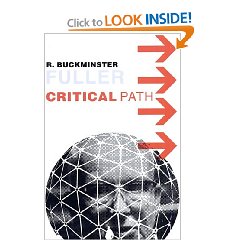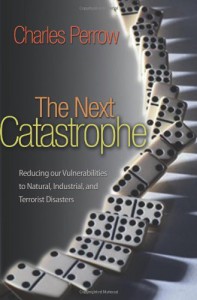
History, Philosophy, Engineering, Architecture, & Education,
1) Economic theory of scarcity and secrecy is evil, benefitting the few at the expense of the many
2) Earth is NOT a zero sum Darwinian game for humans, in fact it is the human role–the human mind's role–to “synergize” Earth into a win-win for all.
3) Money is not wealth only an artifact that is representative of empty bank vaults and gross misrepresentation by the alleged wealthy. Only time-energy accounting and “true cost” of goods and services should be used.
4) Obstacles to displacing rule by scarcity and secrecy are the public ignorance of natural science and the collaboration among governments, corporations and large organizations such as religions and labor unions that “divide and keep conquered.”
5) Computers–and Fuller was clearly envisioning today's computers, not those of his time–if properly fed all of the relevant data can alter perceptions on a just enough, just in time basis. This coincides with my own view that we can and must educate the five billion poor one cell call at a time, but it also favors the ideas gaining currency of connecting the one billion rich (80% of whom do not give to charity) directly with the needs of the five billion poor at the household level of need.
I am hugely impressed with both specific actionable visions and specific actionable facts:
1) Now possible to create a global electrical grid that runs across Alaska into Canada and China, and eliminate the electrical shortfalls in both those countries and in Canada and the US West Coast.
2) In time-energy “true cost” accounting, every gallon of oil that we use cost $1 million (in 1981 dollars, which is to say, around $10 after the current Administration finished with its massive devaluation plans).
3) There are two critical paths that are not understood by the public or those who profess to represent the public: path one is those natural trends that proceed with or without human errors, omissions, and interventions; path two is the human path both local and as a global aggregate.
4) Considered in time-energy terms, both our industrial-era schools and our industrial-era office buildings are lunacy. He provides a fascinating discussion of inland versus island dwellers, concludes that most urban office buildings should be converted into mixed dwelling-telecommuting centers and is generally brutal about our national policies being 50 years out of date (in 1981–that would make them 80 years out of date today, and I agree).
5) He provides a BRUTAL discussion of banking and government bail-outs of banking as well as mortgage fraud that led to the Great Depression, how banks dispossessed the farmers not realizing that the land was over-valued AND that no one else wanted to do the hard work of farming, and I am generally thunder-struck by how history has repeated itself.
I am especially impressed by his “cosmic costing” which does not allow for hoarding (he joins others in cursing money as both a hoardable good and one that can draw interest beyond reason).
A goodly portion of the book covers the art of doing more with less; doing it faster; and ultimately benefitting increasing numbers of humans with the same technologies.
His discussion of “precession” revolves around not competing with anyone else, instead attending to the unattended. He has a gift for “comprehensive consideration” that we could all draw upon for inspiration.
I am completely absorbed by this book, which includes in the final third:
1) The challenge is to educate all humans, and to teach humans to learn in the shortest possible time–my kids have two answers: cell phones and video games. This is a no-brainer.
2) I offer some quotes below but am totally engaged with his discussion of the Geoscope, what some today might call an Earth Monitoring System, and his view that we can create a 200 foot version of the Earth where one inch equals three miles, and using computers, be able to illuminate for any human–however poorly educated or ideologically stunted–what actually IS the reality.
3) He spends time describing the World Game and cites two books by Medard Gabel that are no longer available via Amazon (but see the EarthGame(TM) technical description offered by Earth Intelligence Network), and describes it as a problem-solving choice-making educational game.
On page 287 I am stunned by his anticipation of the “de-sovereignization” of the United States of America, coincident with the bankruptcy of the US Nation at the hands of its out of control federal government.
On the architectural side I am fascinated by his discussion of flat slab building as the worst possible time-energy construction, and his discussion of the alternatives that he created, including floating cities that I now regard as inevitable.
The book contains an unexpected gem, a compendium created by Fuller based on US contractor experiences in Russia that was delivered to Brazil. It is still valid and it is a model for the kind of clear thinking that government engineers should be able to, but cannot do. [With credit to Chuck Spinney, I have learned that “government specification cost plus engineering” has fried the brains of multiple generations of engineers who are unable to computer biomimicry, cradle to cradle, green to gold, etc. We must wait for our children to rule the world, they are the “digital natives” who will not tolerate rankism, secrecy, scarcity, or lies.
A few quotes are in the comment as I must respect Amazon's 1000 word limit.
Below are some other books that strike me as very complementary of this one, but more recent.
The Fortune at the Bottom of the Pyramid: Eradicating Poverty Through Profits (Wharton School Publishing Paperbacks)
The Landscape of History: How Historians Map the Past
The Philosophy of Sustainable Design
Tragedy & Hope: A History of the World in Our Time
The Health of Nations: Society and Law beyond the State
Rule by Secrecy: The Hidden History That Connects the Trilateral Commission, the Freemasons, and the Great Pyramids
Don't Bother Me Mom–I'm Learning!
Conscious Evolution: Awakening Our Social Potential
Conscious Globalism: What's Wrong with the World and How to Fix It
Information Operations: All Information, All Languages, All the Time
A couple of quotes:
xxv: “It is sa matter of converting the high technology from weaponry to livingry.”
xxxvi: “The race is between a better-informed, hopefully inspired young world versus a running-scared, misinformed brain-conditioned, older world.”
xxxviii: “The political and economic systems and the political and economic leaders of humanity are not in the final examination; it is the integrity of each individual human that is in the final examination. On personal integrity hangs humanity's fate.”
118-119 “The USA is not run by its would-be “democratic” governance…..Nothing could be more pathetic than the role thats has to be played by the President of the United States, whose power is approximately zero.”
169 “The objective of the game would be to explore ways to make it possible for anybody and everybody in the human family to enjoy the total Earth without any human interfering with any other human and without any human gaining advantage at the expense of another.”
See also page 199, page 202, 208, 221, 225, 287, 346
Simple awesome. If you want your children and grand-children to have an intellectual advantage, nurture their thinking on sustainable development and read in yourself on Buckminster Fuller.

Click Here to Vote on Review at Amazon,
on Cover Above to Buy or Read Other Reviews,
I Respond to Comments Here or There





